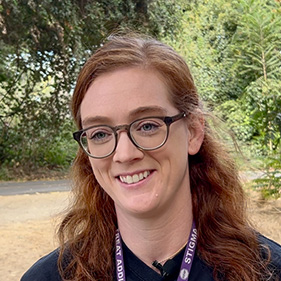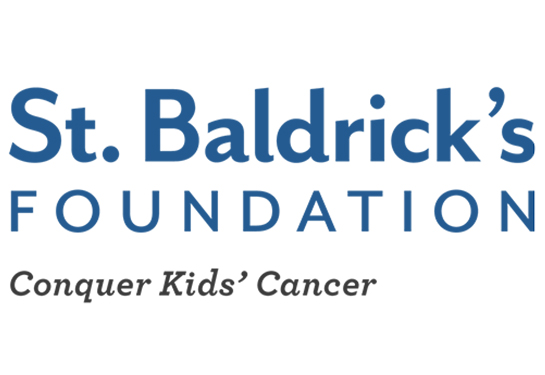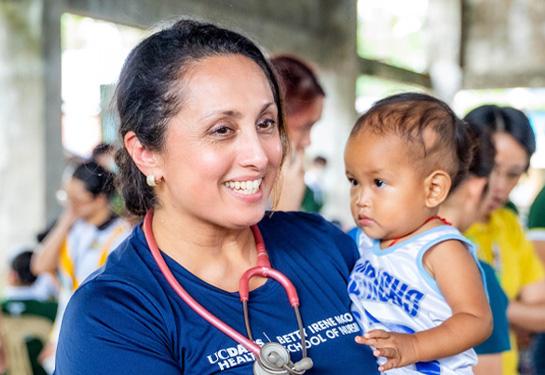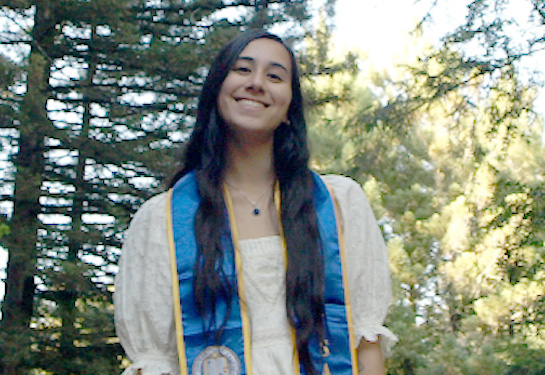Street medicine team improves lives of unhoused patients
UC Davis Health and Sacramento County provide care in and around homeless encampments
Cara Eberhardt’s dark shoes are covered in dust as she navigates the dirt paths that lead to encampments near the American River.
She clutches three clear plastic water bottles, in case tent dwellers want them, but on this sunny morning there are more pit bulls than people. Still, Eberhardt continues along the trail with two colleagues who, like her, are dedicated to improving the health and well-being of people without housing in Sacramento.
Eberhardt is a physician training to specialize in addiction medicine at UC Davis Health. She’s part of a street medicine team that delivers compassionate care to vulnerable populations in partnership with the Sacramento County Health Center.
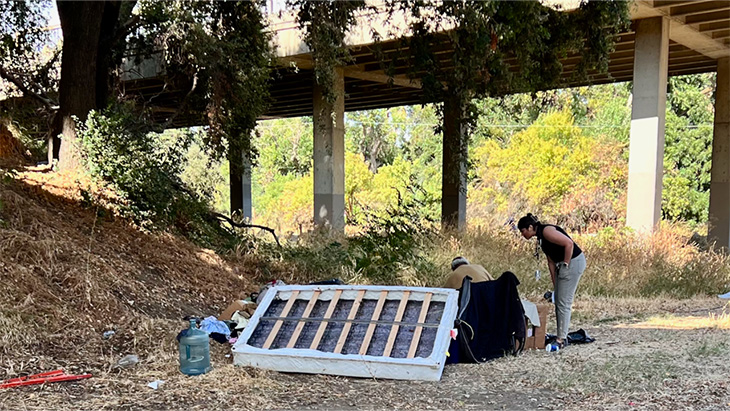
The team includes a group from the UC Davis School of Medicine and another from the Betty Irene Moore School of Nursing. Twice a week, for about the past year, they have cared for patients, most of whom are insured through Medi-Cal and can’t easily get to a hospital or clinic. The team provides comprehensive primary care services such as mental health care, medication, flu shots, wound care and physical exams. They also screen for sexually transmitted infections, provide HIV testing and treat substance abuse disorder.
The providers are based out of the county’s mobile health RV, which parks near encampments across Sacramento as part of its W3 program, Wellness Without Walls. Some of the providers see patients inside the two exam rooms, while other team members walk the nearby streets and trails to offer care.
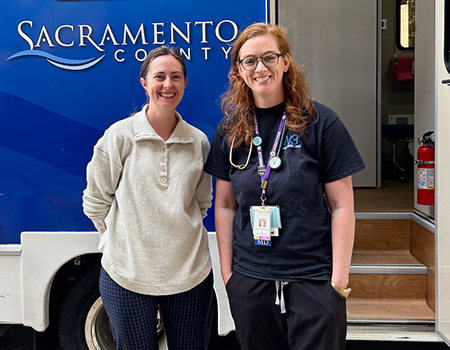
The street medicine team is a lifesaver for unhoused individuals who are uneasy about trekking away from their encampments to seek care. Some can’t access doctors or nurses because they lack reliable transportation. Others won’t leave their tent communities out of fear that the city, county or state will dismantle their encampments and send their belongings to a landfill. Others fret that thieves will steal their property. And those with pets know they can’t take their animals into health care facilities.
But many want to connect with providers.
“People who are living outside, who are experiencing homelessness, care about themselves — care about their well-being, and care about their health — but it’s just difficult to get to doctor’s offices,” said Mary Kathryn “M.K.” Orsulak, a UC Davis Health assistant clinical professor. She is also the Sacramento County Health Center’s leader for the outreach effort. “The goal of this clinic is to decrease the barriers to health care, to literally meet people where they're at, to bring care to them.”
Dr. M.K., as she is known in the community, and in her job in the Department of Family and Community Medicine, is on the RV every Tuesday.
People who are living outside, who are experiencing homelessness, care about themselves — care about their well-being, and care about their health — but it’s just difficult to get to doctor’s offices.”—M.K. Orsulak, leader of UC Davis Health’s Street Medicine team
Valuable training for UC Davis residents and fellows
Holly Kirkland-Kyhn, a wound specialist and family nurse practitioner who is an assistant clinical professor for the School of Nursing, rides the RV on Fridays. That’s also the day when the outreach team goes into encampments to invite people to the RV for breakfast, coffee and water. “Frequently, the atmosphere feels like a positively charged street fair,” Kirkland-Kyhn said.
Orsulak and Kirkland-Kyhn are two of many UC Davis providers — including physicians, residents and nurse practitioners — who work shifts at the Sacramento County Health Center at Stockton Boulevard and Broadway, which treats underserved residents. Being on the street outreach team is an extension of their dedication to caring for vulnerable populations.
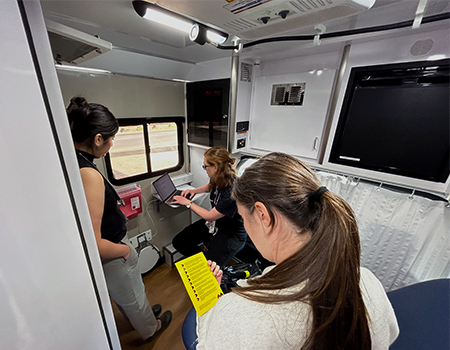
On this day, the white and blue 27-foot clinic on wheels is stationed in front of a North Sacramento trailhead. It is parked almost directly under an elevated section of State Route 160, a thoroughfare that connects downtown with the Capital City Freeway.
While Orsulak saw patients in the exam rooms, Eberhardt walked the trails with a county nurse and Rhea Mahapatra, a UC Davis family and community medicine resident.
The team approached battered tents under large trees. At one of the first locations, a homemade “Beware of Dog” sign stood over the weeds. “Good morning, we’re from medical outreach from Sac County if you need us,” Eberhardt said in a loud voice, trying to make her offer over the sound of a barking dog.
“We have water, Narcan and medical care,” she said at another stop, to a man who wouldn’t come out of his tent. “Do you need anything?” The man declined. The team moved on.
Eberhardt, who received her medical degree from UCSF and completed family medicine residency at Adventist Health Ukiah Valley, joined UC Davis last year for a fellowship in addiction medicine.
Being assigned to the street medicine team, she said, is a boost for her training.
“Taking care of groups of people that are often stigmatized when they seek treatment — for example, people who use drugs or people who unfortunately have to live outside — a lot of times they aren't treated with kindness,” Eberhardt said.
“The chance to get to witness different people’s experiences in life is something I feel lucky to do,” she added. “This is just an innovative way to connect people to medical care.”
Mahapatra, a second-year resident spending her first day on the outreach team, said she, too, had gained valuable experience.
“A lot of times, especially in family medicine, we have a very long-term view of somebody's care — and just thinking about what we can do right here in the moment with the resources that we have, it’s just different,” she said. “I’m not from California. I haven’t really been exposed to this level of homelessness, so it was an experience that I’ll never forget in residency.”
A caring community collaborates with the School of Nursing
An estimated 9,300 people experienced homelessness at a point in time in Sacramento County in 2022, according to the Sacramento Regional Coalition to End Homelessness.
In addition, Sacramento County has the third-largest number of people experiencing chronic homelessness in the nation (4,003 individuals), behind only New York City and Los Angeles, according to a 2023 U.S. Housing and Urban Development report.
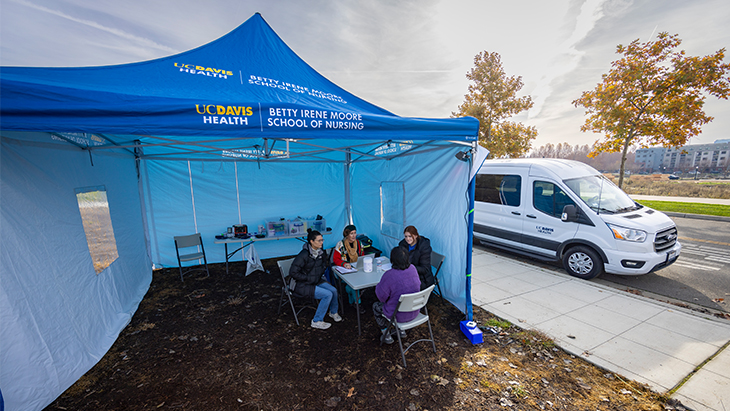
The need for health care beyond the walls of clinics is growing. This has prompted the School of Nursing to respond with its own mobile health initiative, which complements the weekly outreach it participates in with the county.
The initiative operates out of a white van and blue popup tent and relies on partnerships to help provide essential services to the underserved, said Kirkland-Kyhn, assistant director of the school’s nurse-led mobile clinic program. Among the services:
- Anderson Bros. Town & Country Village Pharmacy of Sacramento delivers medicine to sites where the mobile clinic parks.
- UC Davis students help unhoused individuals study for high school equivalency diplomas.
- A veterinarian provides care for pets.
- UC Davis Law students help people living outside with issues related to citations.
“Our biggest strength is that other services want to partner with us to meet the social determinants of health needs for unhoused individuals,” Kirkland-Kyhn explained.
Future plans for the nurse-led team include extending care to refugees, offering smoking cessation classes, performing hearing tests and adding eye care services.
Kirkland-Kyhn and Orsulak are grateful to be working for an organization that allows them to make a difference in the community.
“UC Davis has been extremely supportive, both of myself and the program,” said Orsulak, who is also part of the UC Davis Health addiction medicine division.
“People who are experiencing homelessness are dying in our county much sooner than the rest of the population,” Orsulak added. “People living outside deserve health care, they deserve primary care, they deserve preventative care, and this is one way amongst many options that we need to continue to expand on, to provide care to them.”


